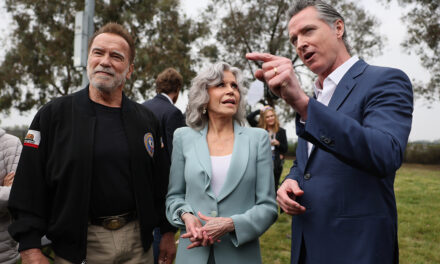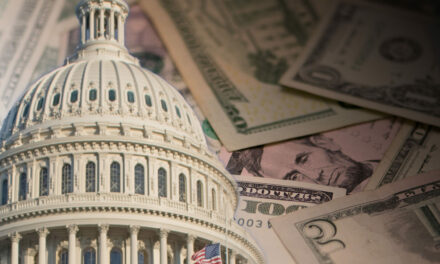We support our Publishers and Content Creators. You can view this story on their website by CLICKING HERE.
Dr. Anthony Fauci’s long-anticipated Monday appearance before Congress was expected to generate fireworks. And it sure did.
From the outset, House Democrats generously praised Fauci’s public service as heroic, while skeptical House Republicans posed probing questions ranging from mask and vaccine mandates to the lack of transparency at Fauci’s agency and his initial response to the origins of the global pandemic in China. At times, partisan divisions became tense and the rhetoric red hot, while Capitol Police escorted hecklers from the hearing room.
Fauci, the former director of the National Institute of Allergy and Infectious Diseases testified under oath before the House Select Subcommittee on the Coronavirus Pandemic, chaired by Rep. Brad Wenstrup, R-Ohio, on a wide range of issues related to his role in the federal government’s response to the COVID-19 pandemic.
Amidst the heat of the hearing, there were shafts of bright light that will, in the subcommittee’s final report this year, clarify critical issues and establish the groundwork for remedial legislation. For example:
Declaring a Lab Leak Was the Origin of COVID-19 Is Not and Was Not a ‘Conspiracy’ Theory
A key issue for COVID-19 oversight is whether the deadly global pandemic had its origins in nature or was the product of a genetically engineered virus that may have somehow leaked from a Chinese research laboratory.
“I have been clear from the beginning,” stated Fauci, “that the lab leak was not a conspiracy theory.” Fauci repeatedly stated that. While he personally leaned toward a natural origin of the coronavirus, he claims that he has had an open mind on the subject since the inception of the pandemic, when the first news of the novel coronavirus came out of China.
He told the subcommittee that he did not try to steer the conclusion about the COVID-19 origins and he did not edit the draft of the influential March 2020 Nature Medicine article that concluded that the novel coronavirus was not a “laboratory construct.”
Despite Fauci’s disclaimer, Rep. Jim Jordan, R-Ohio, pressed Fauci on the issue, noting that he and other top officials at the National Institutes of Health, including then-Director Francis Collins, seemed intent on discrediting the “lab leak” theory and promoting the soon-to-be dominant academic and media narrative that the novel coronavirus had its origins in nature.
Most of the top virologists Fauci consulted in February 2020 on the question did, indeed, initially assess that SARS Cov-2, the strange virus that causes COVID-19, was the product of lab engineering, but quickly reversed their position.
Two things remain mysterious to this day. First, how and why a group of top scientists reversed their initial assessments in a matter of days despite the fact that Communist China was utterly uncooperative in sharing vital information or data, imposing government restrictions on any scientific information coming out of China while suppressing the views of dissident scientists.
Second, after four years, the proponents of the natural origins theory of the novel coronavirus have yet to identify the “intermediate host”—the animal that was supposedly infected with SARS Cov-2 before it jumped to humans. Efforts to identify such a necessary host, including pangolins and raccoon dogs, have not come to fruition. In any case, Fauci’s testimony puts the nail in the coffin of the lab leak as “conspiracy theory”—a dismissive narrative once so dominant in the general media.
NIH Has a Serious Transparency Problem
In a previous hearing, lawmakers learned that Dr. David Morens, senior adviser to Fauci, went to extraordinary lengths to create a “secret back channel” (Morens’ language) for communications concerning sensitive COVID-related issues, including the COVID-19 origins issue. He used personal emails and texts to avoid congressional oversight and disclosure requirements under the Freedom of Information Act.
In an April 21, 2021, email embedded in a subcommittee staff report, Morens wrote: “He [Fauci] is too smart to let colleagues send him stuff that could cause trouble.”
Even worse, Morens claimed that the NIH official charged with responsibility for enforcing the Freedom of Information Act, Margaret Moore, helped teach him ways to hide official records. In his Feb. 24, 2021, email, he said, “I learned from our FOIA lady here how to make emails disappear after I am FOIA’d but before the search starts, so I think we are all safe. Plus, I deleted most of those earlier emails after sending them to Gmail.”
In his June 3 testimony, Fauci denied that he had ever used personal emails to conduct public business. He also distanced himself from Morens’ bad behavior, declaring that his senior adviser’s efforts to hide public records or communications by using his personal email was inappropriate, unacceptable, an outlier, and incompatible with NIH policy. As of this writing, Morens and Moore, who assisted Morens in hiding public information, are still employed by the National Institutes of Health.
NIH Grant Process Needs Tougher Oversight
As the former director of National Institute of Allergy and Infectious Diseases, Fauci had responsibility for overseeing billions of dollars in grants for research activities. In his June 3 testimony, Fauci told Congress that he indeed signed off on the grants, but that professional staff below him in the chain of command was primarily responsible for the vetting of these proposals.
The issue has come to a head with the federal grants to EcoHealth Alliance, a New York-based scientific research nonprofit headed by Dr. Peter Daszak. Daszak’s controversial organization had subcontracted research work on bat coronaviruses to the Wuhan Institute of Virology in China. Morens, a friend of Daszak, assisted Daszak in securing grant funding, even editing EcoHealth communications with his agency.
In his June 3 testimony, Fauci said that he was unaware of Morens’ efforts to assist Daszak, which he described as a serious conflict of interest.
The Wuhan Institute was a major center of coronavirus research in China, and Fauci knew that Chinese scientists at the institute were indeed engaged in “gain of function” research (research designed to enhance the transmissibility and harmfulness of a pathogen), as he noted in a Feb. 1, 2020, email to his colleagues at the U.S. Department of Health and Human Services.
In response to questioning by Rep. Morgan Griffith, R-Va., Fauci insisted that it would have been impossible for COVID-19 to come from the virus research conducted by EcoHealth and funded by National Institute of Allergy and Infectious Diseases because those viruses were so genetically different from SARS Cov-2 that they could not have been the progenitors of COVID-19. Fauci added, however, “I cannot account for what else was going on in China.”
EcoHealth, which had received approximately $8 million in taxpayer funds to study coronaviruses since 2014, had a checkered relationship with the federal government. Consider the record:
- In 2024, following an exhaustive review of the communications between EcoHealth and the NIH, the Department of Health and Human Services barred Daszak and EcoHealth from participating in government grant programs.
- In 2023, Health and Human Services’ Office of Inspector General found that NIH had failed to effectively monitor its grants to EcoHealth for research that incurred “inherent risks.”
- In 2021, EcoHealth had come under scrutiny because the organization was two years late in reporting on its experimental work in China.
- In 2020, NIH, under the Trump administration, terminated the organization’s grant funding, although in 2022, the NIH, under the Biden administration, reinstated an additional $650,000 in funding.
- In 2018, the Department of Defense’s Defense Advanced Research Projects Agency rejected an EcoHealth proposal for $14.2 million in grant funding because the organization did not assess the potential risks of gain of function research on bat-borne coronaviruses.
In response to Rep. James Comer, R-Ky., Fauci said, “I did not try to protect Daszak and I did not know about a lack of compliance [with reporting requirements of the grant] until well after the fact.”
Fauci further told the subcommittee that he supports the recent debarment of EcoHealth from participation in government grant programs, an action recommended in a subcommittee report. Nonetheless, the danger of potentially risky grants (such as viral gain of function funding) to biomedical research organizations operating overseas, especially in unfriendly countries, requires urgent congressional attention.
COVID-19 Vaccines’ Effectiveness Have Declined, Undermining Joe Biden’s Argument for Vaccine Mandates
Fauci testified that during the early stages of the pandemic, there was some evidence that the COVID-19 vaccines, (courtesy of President Donald Trump’s “Operation Warp Speed”) were initially effective in preventing infection and the transmissibility of the disease, and the vaccines also surely reduced hospitalization and death and thus saved hundreds of thousands of lives.
But, Fauci said, the effectiveness waned over time, especially given the mutations of the virus. Indeed, in response to a question from subcommittee legal counsel Mitchell Benzine, Fauci observed that the rapid changes in the novel coronaviruses had undercut the possibility of “herd immunity”—widespread natural immunity—in the general population. Herd immunity, he said, can occur if the pathogen is not changing, but with COVID-19, that is clearly not the case: “We never had it with COVID.”
A vaccine’s inability to stop infection or transmission radically alters public policy options. As a matter of policy, Fauci’s admission on this point was crucial because it directly undermines the Biden administration’s case in the Fall of 2021 for a comprehensive set of (illegal) vaccine mandates to be imposed on almost the entire American population. That effort largely failed.
As The Heritage Foundation’s detailed statistical analysis demonstrated in 2022, Biden’s insistence that the pandemic was a “pandemic of the unvaccinated” was incorrect. With the passage of time, the vaccines did not prevent infection or stop transmissibility, and vaccinated Americans also found themselves in hospitals or ended up in funeral homes.
During the hearing, Rep. Michael Cloud, R-Texas, observed that when the scientific data had become clearer, the nation did not get the timely and necessary revisions that the emerging data required.
NIH Employees Are Recipients of Hundreds of Millions of Dollars in Private Sector Royalties
In response to a question from Rep. Nicole Malliotakis, R-N.Y., on whether he had received any royalties from pharmaceutical or other biomedical research companies since 2021, Fauci said he had received none.
Malliotakis raised the issue since the New York Post had published a report that there was a major increase in royalty payments to 260 scientists (amounting to $710 million) employed by the National Institute for Allergy and Infectious Diseases during the pandemic. The actual and potential conflicts of interest at the NIH also require urgent congressional attention.
The three-and-a-half-hour House hearing touched on numerous other subjects, including the competing and confusing definitions of gain of function research; the state of public health and the public perceptions of public health agencies; the lack of scientific evidence behind the six-foot social distancing recommendations of the Centers for Disease Control and Prevention; the costs of the forced closures of businesses, churches, and schools; the social and psychological impact of the lockdowns; the lack of scientific evidence for mask mandates for children under age 5; and the censorship of medical professionals in the media, social media, and elsewhere.
In reforming and repairing the American public health system and the people’s trust in it, it is clear Congress and the next presidential administration have a very big job ahead of them.

 Conservative
Conservative  Search
Search Trending
Trending Current News
Current News 





